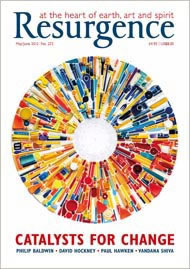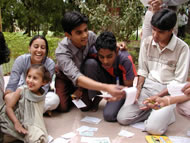Margaret (Meg) Wheatley is co-founder of The Berkana Institute, a global charitable foundation founded in 1991. She is the author of five other books, including Leadership and the New Science and Perseverance. She has been a consultant and speaker since 1973, and her work draws on different disciplines from cosmology to social policy.
In 2001, Deborah Frieze walked out of her career as an executive in the high-tech industry. She was disillusioned by a business culture that emphasised short-term results, looked upon growth as an end rather than a means, and cared more about compliance than community. In 2005 she became Wheatley’s successor as co-president of Berkana. She served in that capacity for four years, deepening the work of the Berkana Exchange and launching many new initiatives with partners across the globe.
In this book we are invited to embark on a journey that will both disorientate us and challenge our assumptions. I decided to accept this invitation and travelled eagerly with the authors into the lives of seven remarkable communities in Mexico, Brazil, South Africa, Zimbabwe, India, Greece and the USA, all part of the Berkana Exchange and all proof that there is a different way to live.
Reconnecting with the belief that it is possible to discover and build solutions to apparently intractable negative situations has enabled remarkable transformations to take place, often against a backdrop of oppression or extreme poverty. The people in this book have challenged the belief that powerlessness and failure are inevitable, but this book is not just a journey of empowerment: it is also about leadership and learning.
Each of the communities we visit has found its own way of building peer-based learning, challenging the stereotype of the all-knowing teacher filling up the ‘empty vessels’ that are his or her pupils. And in the stories that form the core of this book we find co-learning everywhere in these communities, where everybody comes to learn and everybody has knowledge or a skill to give.
Unitierra, in Oaxaca, Mexico, is one such place where ‘magic happens’. Without teachers or a curriculum, people join together in ‘co-motion’ to learn and create solutions to urban agriculture. (Co-motion, say the authors, is about walking at the pace of the other.)
Walk Out Walk On challenges us to examine our own thinking and practice. The people in these stories have ‘walked out’ of old ways of thinking, and then ‘walked on’ with others towards alternative models of organising. They have rejected the idea that power must be vested in the hands of the few, and in doing so they discovered the creative power of collective endeavour for local change.
In Berkana’s model, communities of learning and action start locally, then connect and learn from each other, applying their learning to their own unique settings. This process happens by ‘scaling across’, instead of ‘scaling up’; this is one of the deep-rooted philosophies of Berkana.
The uniqueness of each place shines through in this book. Their stories illustrate how recognition of interdependencies creates the trust and cooperation to overcome seemingly insurmountable obstacles. The authors urge us to “start anywhere, follow it everywhere”, and it is this lesson that challenges our usual desire to control every project.
Walk Out Walk On offers some gentle signposting to assist our reflections. From Zimbabwe we learn about efficiency and resilience. From India we learn to reflect on gifting and experimentation. In Greece we explore intervention and friendship. At each turn, we are invited to challenge our own thinking and to consider alternative ways of living and being. This book is not just a book. It is a movement. It shows us convincingly that our world can be different, and that change can happen – if people decide to walk out and walk on.
For more information visit www.walkoutwalkon.net and www.berkana.org
Sharon Turnbull is a former director of the Centre for Applied Leadership Research and is co-editor of Worldly Leadership: Alternative Wisdoms for a Complex World, ISBN: 9780230284708.








